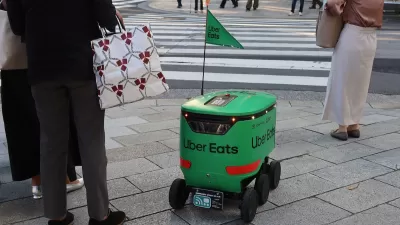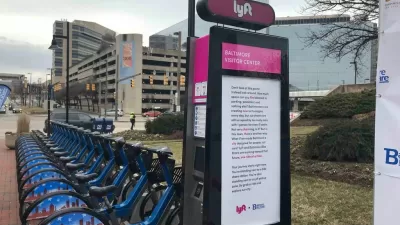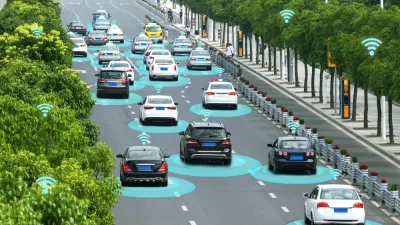Contrary to one some urbanists believe, some of the advancements of the new economy might better serve less dense, even suburban, environments. Example: a delivery robot created by the co-founders of Skype.
John Markoff provides a dispatch from the front lines of the automated economy in Menlo Park, California, where entrepreneurs he recently witnessed the debut of a robot capable of autonomous navigation, designed to solve the "last mile" problem familiar to planners: "getting goods like groceries, drugstore items and most small packages to suburban homes."
As self-driving cars and delivery services continue their quick ascent in the popular consciousness, products like this robot created by Starship Technologies with finding from Skype co-founders Ahti Heinla and Janus Friis, could join the two in futuristic synchronicity.
"Their task is simpler than the one facing designers of self-driving cars, because if something goes wrong, the Starship robot is much less likely to cause harm. While Amazon and Google are pursuing the idea of using airborne drones to deliver packages in urban areas, Mr. Heinla, who serves as the chief technology officer for Starship, believes his ground-based approach is more practical."
Markoff's explanation of the business model that rides on the success of this robot includes one critical distinction: "The system is not intended for crowded urban environments….Rather it is targeted for relatively affluent and uncrowded suburban neighborhoods, gated communities, assisted living facilities and campuses, where it will travel on sidewalks, programmed to mingle freely with pedestrians, bicyclists and cars."
FULL STORY: Skype Founders Build a Robot for Suburban Streets

Alabama: Trump Terminates Settlements for Black Communities Harmed By Raw Sewage
Trump deemed the landmark civil rights agreement “illegal DEI and environmental justice policy.”

Study: Maui’s Plan to Convert Vacation Rentals to Long-Term Housing Could Cause Nearly $1 Billion Economic Loss
The plan would reduce visitor accommodation by 25% resulting in 1,900 jobs lost.

Planetizen Federal Action Tracker
A weekly monitor of how Trump’s orders and actions are impacting planners and planning in America.

Wind Energy on the Rise Despite Federal Policy Reversal
The Trump administration is revoking federal support for renewable energy, but demand for new projects continues unabated.

Passengers Flock to Caltrain After Electrification
The new electric trains are running faster and more reliably, leading to strong ridership growth on the Bay Area rail system.

Texas Churches Rally Behind ‘Yes in God’s Back Yard’ Legislation
Religious leaders want the state to reduce zoning regulations to streamline leasing church-owned land to housing developers.
Urban Design for Planners 1: Software Tools
This six-course series explores essential urban design concepts using open source software and equips planners with the tools they need to participate fully in the urban design process.
Planning for Universal Design
Learn the tools for implementing Universal Design in planning regulations.
Caltrans
Smith Gee Studio
Institute for Housing and Urban Development Studies (IHS)
City of Grandview
Harvard GSD Executive Education
Toledo-Lucas County Plan Commissions
Salt Lake City
NYU Wagner Graduate School of Public Service





























